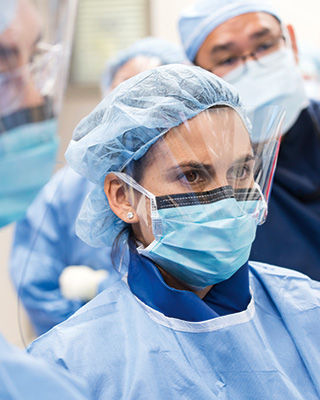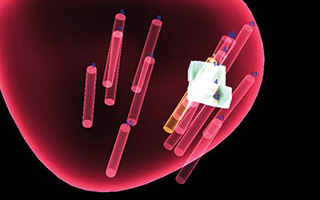Studies address stone disease pain

Urologist Alana Desai, MD, hears patients with urinary stone disease describe the accompanying pain as the worst they have ever experienced; women report that it is more painful than childbirth. Yet funding and research studies on how to alleviate this pain and prevent recurrence have been limited.
The National Institute of Diabetes and Digestive and Kidney Diseases (NIDDK) broke new ground when it formed a funded network of investigators at Washington University and four other institutions to establish the Urinary Stone Disease Research Network to focus on management and recurrence of stone disease. The NIDDK grant will fund observational studies on hydration practices and the use of ureteral stents. The agency also will set up a biorepository to collect specimens.
Desai and fellow Washington University urologist H. Henry Lai, MD, co-principal investigators, both treat patients with urinary stone disease.
“Our goal in the hydration trial is to study hydration effect on recurrence of stone disease in adults and children,” says Desai. “We know that increasing fluid intake reduces the risk of recurrent stones. We will look at ways to maintain that over the long term with a multi-component behavioral intervention program.”
Desai will lead the trial in patients from Barnes-Jewish Hospital and St. Louis Children’s Hospital, comparing a control group given standard care with a treatment group that receives incentives to take additional fluid each day and guidance from a behavioral therapist if they do not meet their goals.
Some patients also suffer severe pain and discomfort from stents placed in the ureter after endoscopic stone surgery. Urgency or frequent urination may accompany this pain. Lai will conduct a study to identify factors that predict which patients will experience these issues, information that could influence treatment decisions and patient counseling.
Washington University and the other centers will contribute blood, urine and microbial samples to a central NIDDK biorepository, which is the first in the country for stone disease.
Other centers in the NIDDK study are Duke University, the University of Pennsylvania, the University of Texas Southwestern and the University of Washington.
Highlights

A NEW BIOPSY PROCEDURE detects prostate cancer more precisely and reduces the need for additional biopsies. Washington University urologists are the only specialists in the central Midwest to offer the procedure, which improves upon standard ultrasound guidance. Called magnetic resonance imaging (MRI)/ultrasound fusion, it begins with a radiologist capturing MRI images of the prostate, generating a 3-D reconstruction of the organ, and mapping anatomic landmarks and suspicious regions. That 3-D map is then merged with the urologist’s real-time ultrasound imaging during the biopsy, so that he or she can place biopsy needles more precisely. Division Chief Gerald Andriole, MD, also is working on software that allows urologists to alter biopsy needle placement to further reduce infection risk.
QUALITY IMPROVEMENT and process enhancement are the aims of the division’s monthly morbidity and mortality (M&M) conference. The group, which examines breakdowns in patient care and seeks ways to avoid them, recently expanded its focus beyond cases involving death or complications. Other divisions are following suit.
DANE JOHNSON, MD, joins the faculty after a fellowship in male infertility and andrology at the Medical College of Wisconsin in Milwaukee. He will specialize in men’s health and male infertility in collaboration with Washington University in vitro fertilization specialists, creating the only multidisciplinary program in the region for infertile couples.
GREG MURPHY, MD, joins the faculty after a reconstructive urology fellowship at the University of California-San Francisco. He specializes in urethral stricture and congenital abnormalities in adults.
SAM BHAYANI, MD, was named the Holekamp Family Endowed Chair in Urology.